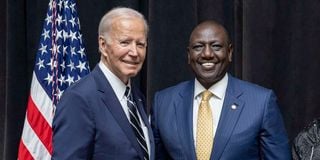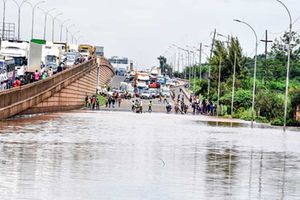
UP President Joe Biden (left) and President William Ruto.
President William Ruto is about to embark on one of the most important assignments of his term, the State visit to the United States of America, next week.
It is also an important moment for Kenya: The US is not Uruguay; it has immense power to alter the fortunes of nations that it has an interest in.
Many will recall how America led the reconstruction of wartime Europe and Japan after World War II. Yes, we are not Germany or France; but then, neither is Taiwan, Thailand, Singapore or South Korea.
For whatever reason, the US seems to be interested in Mr Ruto. The smart thing to do is to rally behind our interests as a country and use this sunshine moment to build better and stronger relations with the US.
This includes finely calibrating and balancing our relations with big US foes, China and Russia, because there are things we can do better with those other countries.
Their fight with the US is not our fight; I couldn’t imagine a situation where China would sacrifice its trade or other interests to support us in a quarrel with a strategic ally.
In terms of Kenya’s issues, I think the most important is neither security nor trade or, indeed, the export of labourers to the land of the brave and free. It is investment in strategic sectors such as semi-conductors, battery technology and mobile phone components, where we seem to have a slippery toe-hold.
Research and innovation
Somebody shared on social media the story — which I have not confirmed — of Prof Wafula of JKUAT, who, along with nine scientists from various countries, took a programme in microelectronics engineering and semiconductor physics at Cambridge.
According to the poster, the other eight went back to their countries, possibly to set up manufacturing or training institutions, while our man was poached by a US university.
I think the Kenyan delegation should aim to identify the many Wafulas out there and partners who can raise the capital for research, innovation and manufacturing in those strategic areas.
I was amused to read that somebody has been mining coltan in Embu County and telling locals that they were excavating rocks for ballast. Coltan is used to produce capacitors in mobile phones and laptops and is a strategic mineral.
There are deposits in Kenya which can, perhaps, form the nucleus of a tantalum capacitor industry and be scaled partly with imports from Rwanda and the Democratic Republic of the Congo. The team can look for technology and capital deals from the US.
The third area is, of course, digital technology. I have a big, big quarrel with President Yoweri Museveni of Uganda, a man I otherwise think highly of.
When he was delivering his ex-cathedra remarks in Gigiri recently, he said ICT means communication, “hallo, hallo” and that “people don’t eat computers”.
Disrupt all businesses
The President’s briefings missed that the digital revolution is the single-biggest transformation of humans and their society ever. Yes, it changes how humans communicate, but also how they work and construct relations.
As a matter of fact, the deployment of AI will disrupt all businesses in all sectors. As a student of history, President Museveni must know that changes in Homo sapiens’ behaviour almost always resulted from genetic mutations; now we are in charge of our own evolution, we are designing ourselves, changing how we communicate and think and letting biology catch up.
The Kenyan delegation should have a basket of AI asks, possibly in the area of training cooperation.
In this life, there is no such thing as a free lunch. Many Africans think that other societies can do things for them out of pity; pity has never been a strong basis for policy action.
The US and Kenya have in the past worked very well on security because of shared adversaries and Kenya’s willingness to help with the fighting.
Kenya has also been prepared to take part in peacekeeping and other jobs of that nature, such as the current one in Haiti.
As a result, the US has trained and equipped Kenyan troops and law enforcement. In 2020, US security assistance to Kenya was $560 million.
Peacekeeping support
The US sold to us almost $140 million worth in the past couple of years and remains our main key partner in counterterrorism, border security, aviation security, maritime security (including the newly established Kenyan Coast Guard) and peacekeeping support.
When Al-Shabaab attacked Westgate Mall in September 21, 2013, Kenya had only one SWAT team, based in the GSU (I could be wrong), and although they were quite capable, command confusion resulted in friendly fire which saw casualties.
But with American support, Kenya now has significant capacity to deal with Al-Shabaab — as the militants would doubtlessly confirm, given their frequent encounters with KDF in Boni Forest.
In trade, the US buys almost a billion dollars worth of our exports; Kenya has leveraged Agoa to increase textile exports to the US from $55 million in 2001 to $603 million in 2022, which is good, but the US is the only market where you can become a dollar millionaire selling needles, in just one state.
There is room for more trade in agriculture and manufacturing and the challenge is to manoeuvre into it.
I have run out of space, but this visit is a fat morsel that America has put in Mr Ruto’s mouth. He should not swallow it; he should masticate and feed us.
Mr Mathiu, a media consultant at Steward-Africa, is a former Editor-in-Chief of Nation Media Group. [email protected]










